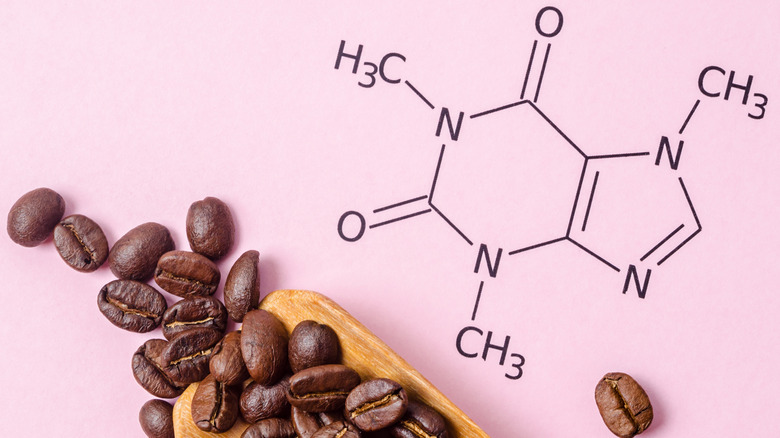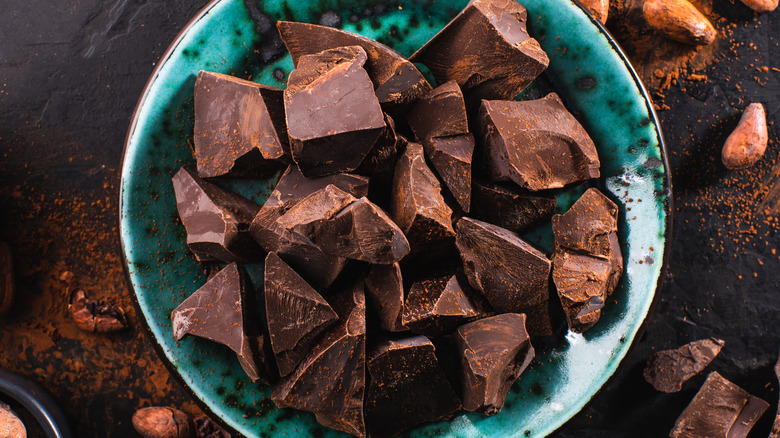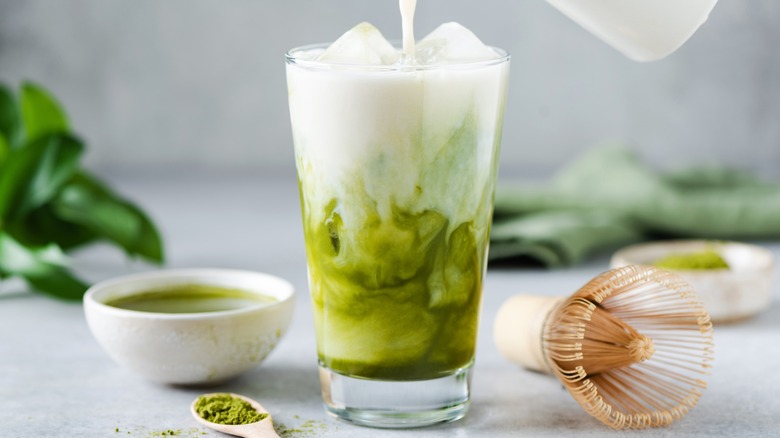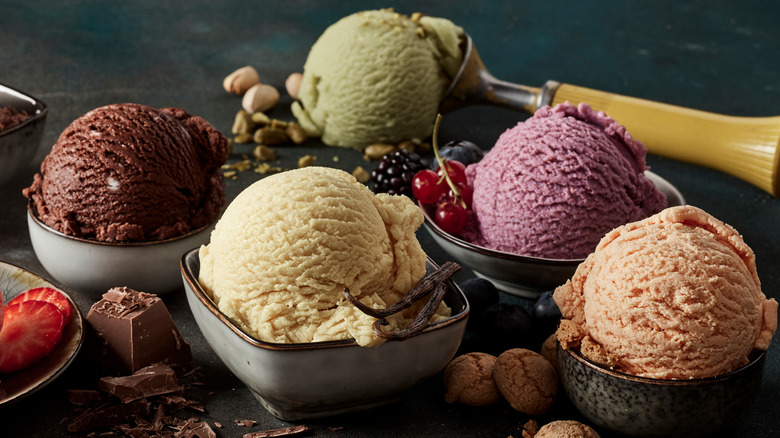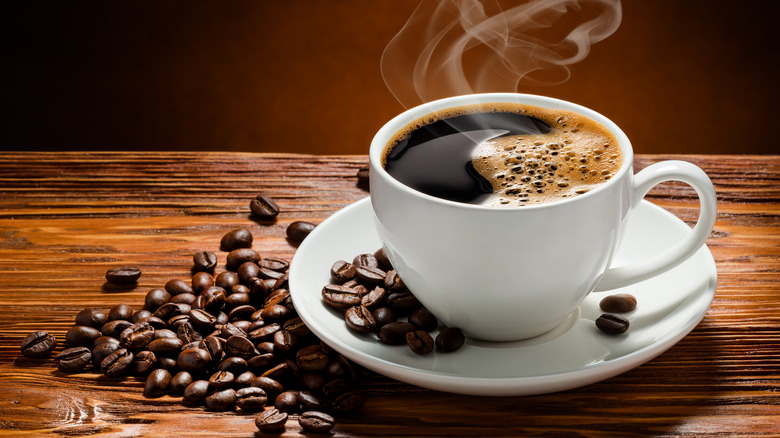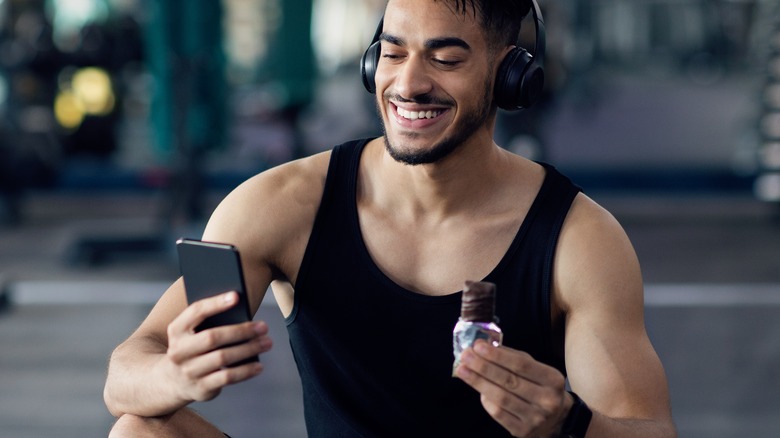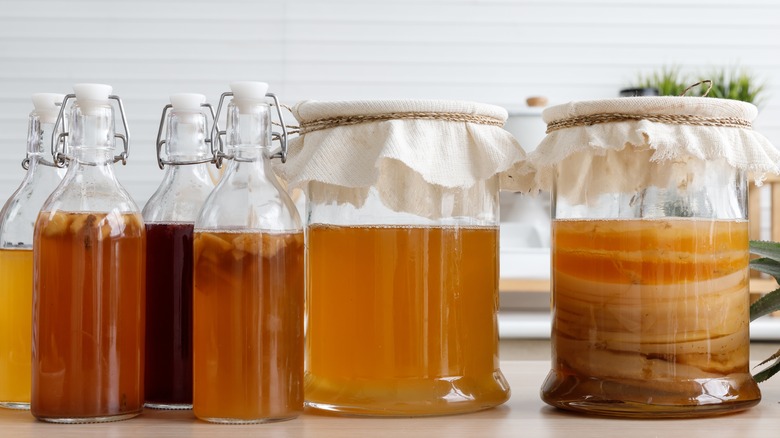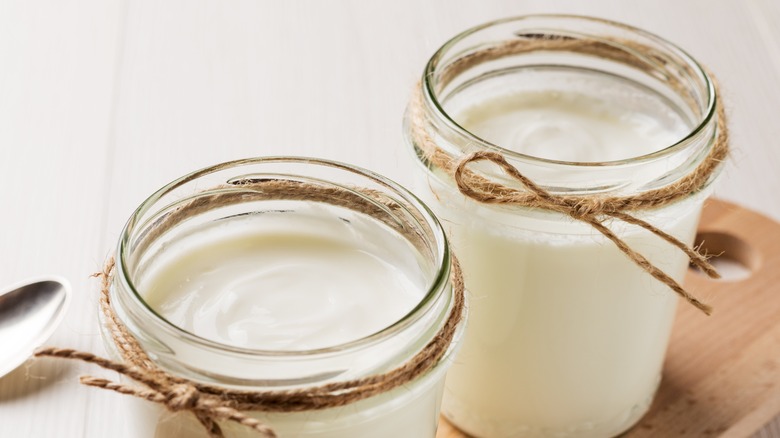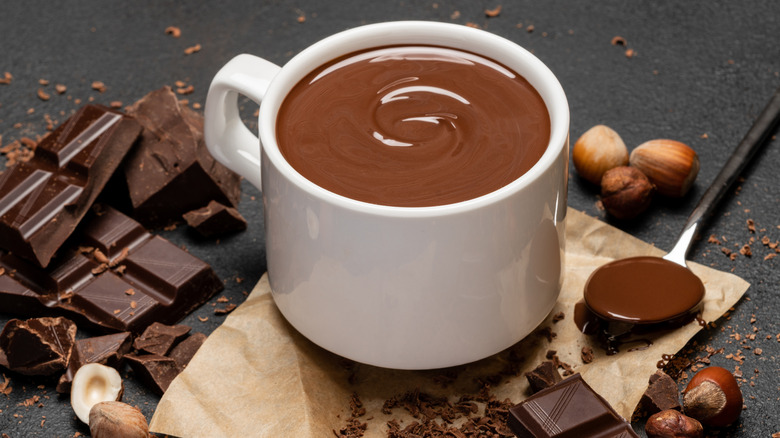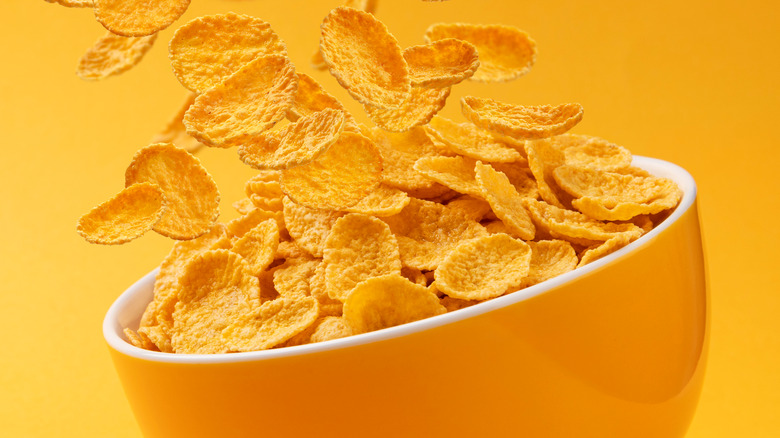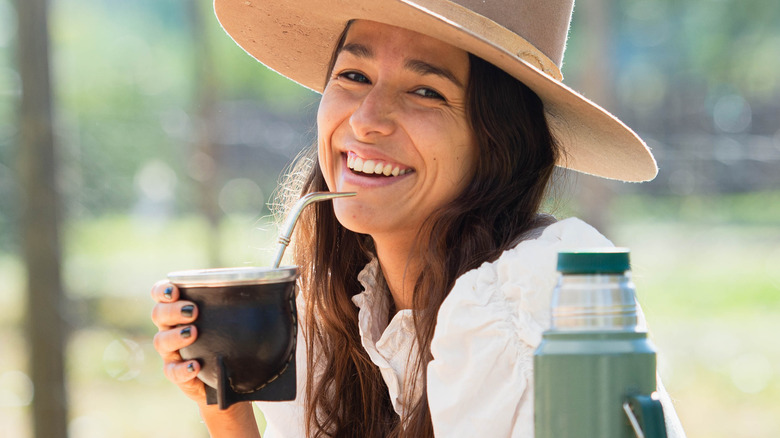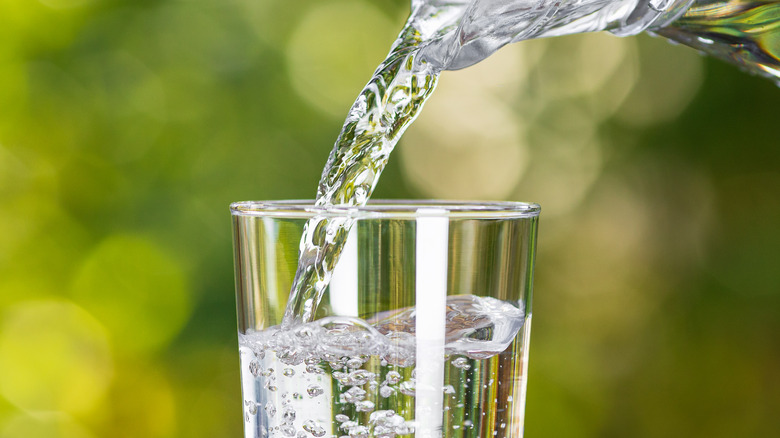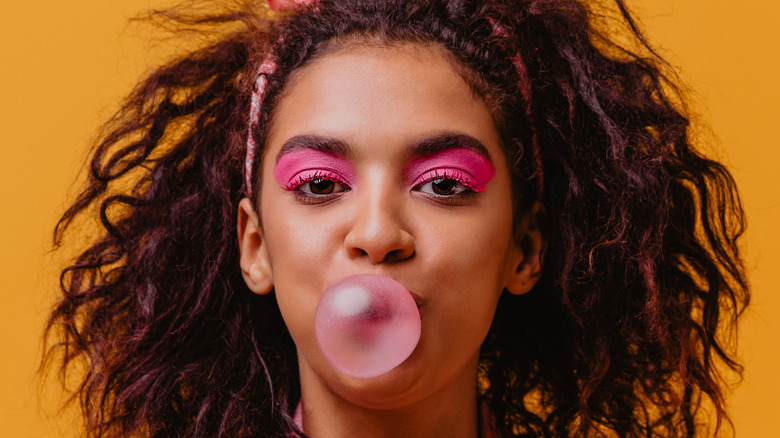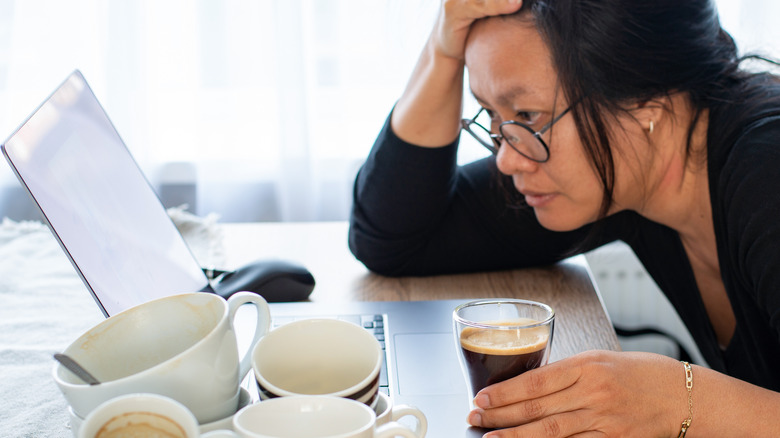Foods You Never Expected Contain Caffeine
Have you had a caffeinated beverage today? If it's past midday, we're willing to guess that it's likely you have. And if you haven't, you're one of only 15% of people who don't consume a drink containing caffeine every day in the U.S., with the other 85% of the population running to their coffee machines like there's no tomorrow (per research published in Food and Chemical Toxicology).
Caffeine is everywhere, and it's easy to see why we love it. Aside from the crucial role that caffeine plays for many people in getting them going for the day, the stimulant may also improve our brain function and alertness, give us a better capacity for long-term memory, protect our liver health, and make us better on the running track, according to Medical News Today.
But here's the thing. When we say caffeine is everywhere, we mean everywhere. The chemical can show up in a huge range of food and drink items that we really weren't expecting, and for folks who have caffeine sensitivity or don't want to consume caffeine, even a tiny amount of the stimulant can be bad news. That's why we decided to put together a list of some foods you never expected to contain caffeine, so you can make sure you're only consuming it when you really want to.
Chocolate
People worldwide flock to chocolate for its delicious taste and creamy, indulgent texture. But that bar of chocolate you're chewing on? It may have more than just cacao beans and sugar in it.
Many types of chocolate contain caffeine as a byproduct of their production process, according to Healthline. When chocolate is made, the cocoa beans it's made of are separated into cocoa butter and cocoa solids. Cocoa solids have caffeine in them, and these end up in your chocolate, along with the cocoa butter.
However, as the concentration of cocoa solids in chocolate varies, certain types contain more caffeine than others. The more cocoa solids a bar of chocolate uses, the darker it is — and the darker it is, the more caffeine it has in it. In some cases, this caffeine content can be surprisingly high, with super-dark chocolate made with 70%-85% cocoa solids containing around 80 grams of caffeine per 100-gram serving (per the USDA). Elsewhere, the caffeine amount isn't significant enough to worry about unless you're being particularly careful about intake, with milk chocolate containing 20 milligrams of caffeine per 100 grams (per the USDA), and white chocolate containing no caffeine at all, due to not being made with cocoa butter.
Matcha
For folks who are trying to give coffee or regular tea a break, they might be lulled by the bright green creaminess of matcha. We get it: It looks awesome. But this gentle-looking beverage conceals a hidden secret, and that hidden secret is a pretty solid caffeine content.
The amount of caffeine you get from a matcha beverage is fairly high, and roughly equivalent to that of green tea, according to Women's Health Magazine. But thanks to the method by which it's usually drunk (i.e., by consuming the leaves), you'll probably get a little more bang for your buck, usually around 70 milligrams of caffeine per cup.
However, if that doesn't put you off matcha, it could prove to be a great choice for people looking to avoid a dreaded caffeine crash. According to "The Small Change Diet" author and registered dietitian Keri Gans, matcha contains l-theanine, an amino acid that "is believed to have a calming effect on the body." And that calming effect also helps you to process caffeine at a more sustained pace, thereby avoiding the quick hit of energy and sudden tiredness that a strong cup of coffee may give you.
Ice cream
Okay, we've gotta admit: We weren't expecting this one, either. But, dear readers, it's true. Some types of ice cream do contain caffeine. Perhaps unsurprisingly, the main culprits are ice cream brands and flavors that have coffee in them. Great for a pick-me-up after dinner, sure, but not so good if you're hoping to head off to sleep pretty quick.
And the levels of caffeine in some ice cream brands could surprise you. Ben & Jerry's Coffee Coffee BuzzBuzzBuzz flavor, for example, has about 100 milligrams of the stimulant per cup, according to 2015 estimates from Caffeine Informer. To compare that in a form we'll understand — i.e., to caffeinated drinks — that's over twice the amount that you're getting in a cup of black brewed tea, and more than what you'd be consuming in a cup of instant coffee (per the Mayo Clinic).
Häagen-Dazs' coffee flavor fares slightly better, but still has over 21 milligrams of caffeine per ½ cup of ice cream (per Bon Appetit), a little less than a cup of green tea. If you want to enjoy coffee ice cream without fear of caffeine, though, it's wise to opt for Talenti's desert range, with their Coffee Toffee and Coffee Chocolate Chip flavors both containing a super-small amount, between 5 and 8 milligrams of caffeine per serving.
Decaf coffee
Yep. We know. It contradicts all logical thought, this one. But it is true: Some decaf coffee may contain a sizeable amount of caffeine, especially if you're buying it from your favorite coffee chain.
An investigation conducted by Consumer Reports (as cited by the New York Times) hit the streets and tested decaf coffees from six different major chains: Burger King, McDonald's, Starbucks, Seattle's Best Coffee, Dunkin' Donuts, and 7-Eleven. After gaining six cups of decaf coffee from each store, they then tested them, to see how much caffeine they actually contained. And the results, folks, were shocking. Some cups contained barely any caffeine at all, but others, such as a cup from Dunkin' Donuts, came in as having as much as 32 milligrams of the stimulant in them. One Starbucks decaf coffee, in a similar vein, had 21 milligrams of caffeine. Now, we don't know about you, but that's pretty high for a decaf, right?
The investigators on the coffee case here also found that the regular coffees from these stores also had a huge variability of how much caffeine was in the cup, with some servings going all the way up to 281 milligrams. So where to go if you want decaf coffee that's, you know, decaf? The lowest caffeine content across the board for their decaf coffees was ... drumroll, please ... McDonald's. Another reason to visit the Golden Arches.
Snack bars
We can rely on snack bars to give us a pick-me-up of energy when we're facing our mid-afternoon slump. But what we don't bargain on, sometimes, is the type of energy they give us. Some snack bars out there can contain a huge amount of caffeine, and if we're not checking the label carefully, we might be way more wired than we bargained for.
Take Clif Energy Bars, for instance. One look at their Cool Mint Chocolate bar may not immediately reveal the presence of caffeine, but they actually contain 49 milligrams per serving, according to Caffeine Informer. Their Espresso Mini flavor has even more caffeine, with roughly 65 milligrams in each bar, approximately equivalent to an actual espresso shot, as the Mayo Clinic shows. It's worth pointing out, though, that a lot of Clif bars contain minimal amounts of caffeine, which is only present due to the chocolate in them, with their Chocolate Chip or Chocolate Almond Fudge flavors containing between 3 and 5 milligrams. If you're looking to keep it completely caffeine-free, it's wise to look for snack bars that don't contain any chocolate.
Kombucha
Few food and drink items are as trendy as kombucha right now. The fermented beverage is lauded for providing a host of health benefits, from delivering powerful probiotics to your stomach to assist with gut health to boosting your vitamin, mineral, and antioxidant intake says registered nutritionist Jo Lewin (via BBC Good Food).
But it's all too easy to forget what kombucha is made of: tea. And this tea imbues your fizzy probiotic beverage with a certain amount of caffeine. It should be noted that the caffeine content of kombucha is generally much lower than the tea that it comes from, with up to half of the caffeine from the original beverage making it into the new one (per Caffeine Informer). But the caffeine levels are also dependent on a range of factors: from the strength of the tea it was made from to how long the drink was left to ferment and develop, says Healthline. For kombucha made at home, this can make the caffeine level difficult to identify with precision, but if you want to stay on the low-caffeine side, pick a tea lower in caffeine, or even a decaf brand. And bear in mind, too, that caffeine's not the only thing that's lurking in kombucha: There's also a small amount of alcohol in the drink.
Yogurt
Of all the things you'd expect to be in yogurt, caffeine is probably not high on your list. But sitting alongside the muscle-friendly protein, healthy probiotics, and the sometimes not-insignificant amount of sugar that yogurt provides, there can also be caffeine. Weird, right? You'll probably be happy to hear, though, that the caffeine is only present in certain flavors — and you probably won't be surprised to hear that it's coffee flavors that provide it.
And the caffeine level in some coffee yogurts can be eyebrow-raisingly high. A single serving of Dannon Coffee Yogurt, for example, contains 32 milligrams of caffeine, according to Caffeine Informer. While not a massive amount in the grand scheme of things, this is still higher than the caffeine you'd get in your average can of Coke, or even in a cup of green tea, says the Mayo Clinic. Given that yogurt is something you expect no caffeine in, that could provide an unintentional boost.
If you're looking to keep your caffeine content low, though, it's not all bad news: Simply opt for plain Greek yogurt instead, which contains none of the stimulant, and is also much lower in sugar than flavored options, with just over 3 grams of sugar per 100-gram serving (per the USDA).
Hot chocolate
At the end of the long day, there's nothing quite like hot chocolate. Soothing and creamy, it's the perfect drink to make us drowsy before bed. Except sometimes, drinking hot chocolate can have exactly the opposite effect, thanks to the fact that depending on which beverage you choose, it might have caffeine lurking in it. If you get your hot chocolate fix at Starbucks, there might be more than you think, with 25 milligrams of caffeine in a Grande-size cup, around the same amount as a weak cup of black tea (via Healthline).
If you're making hot chocolate at home, though, you're in slightly more luck, with a single packet of Swiss Miss Chocolate Hot Cocoa Mix containing barely any caffeine at all — between 1 and 3 milligrams, says the Center for Science in the Public Interest. Opting for a cup of chocolate milk instead of hot chocolate will keep your caffeine levels low, too. And although most people know that mocha is higher in caffeine thanks to its mix of coffee and chocolate, don't be fooled into thinking it's somehow less caffeinated because of its sweeter flavor. A Grande-size Caffé Mocha from Starbucks will supply a whopping 175 milligrams of caffeine.
Breakfast cereal
We rely on breakfast cereal to provide a quick meal in the morning that puts a spring in our steps for the rest of the day. But what we don't expect is that spring to come from caffeine. Amazingly, though, certain types of breakfast cereals do have caffeine in them — although luckily, not in any significant quantities.
The breakfast cereals that all contain caffeine get their content from chocolate flavorings. Malt-O-Meal Coco-Roos is one of the most caffeinated options out there, at 1.8 milligrams per ¾ cup serving (per My Food Data). Malt-O-Meal Chocolate Marshmallow Mateys and Malt-O-Meal Cocoa Dyno-Bytes also have low caffeine content, containing 1.5 milligrams and 1.2 milligrams respectively for a ¾ cup bowl. While ideally, we'd have our breakfast cereals being caffeine-free, bear in mind that you may not even notice a stimulant effect after consuming such a small amount. Given that the upper safe limit of caffeine for most adults is 400 milligrams (per the Mayo Clinic), you'd have to eat literally hundreds of bowls of these cereals to get to that point.
Yerba mate tea
Herbal teas have long provided consumers with a caffeine-free hot beverage to enjoy throughout their day. And given that yerba mate tea falls into the "herbal tea" category, as the Mayo Clinic points out, you might expect it to be similarly caffeine-free. But alas, this is not the case, and the amount of caffeine you get from a cup of Yerba mate tea can be pretty variable, and in some cases, super high.
Research published in Nutrients states that the caffeine content of Yerba mate can be anywhere from 25 milligrams to a huge 175 milligrams. On average, a cup of Yerba mate will come in at around 85 milligrams, which won't exactly calm you down (per Healthline).
If you still want to enjoy herbal tea but don't want the caffeine, then you'll be pleased to hear that you've got a huge amount of options available. Alongside the more well-known caffeine-free teas like chamomile and peppermint, echinacea, Maca, and hibiscus tea can also provide a warming beverage without stimulating you (per Livestrong). Rooibos tea may also be a great choice, as a caffeine-free drink that still provides a robust flavor and huge health benefits (per BBC Good Food).
Water
Okay, so this one blew our minds a little bit too, gang. But it's true: Some waters do contain caffeine. In the ever-expanding water market, where clever formulations that are designed to imbue you with health line every store shelf, there are some brands out there that include caffeine to make your sips a little more energizing (per Eat This, Not That!). This caffeine can often come from the inclusion of guarana, a plant extract that has not only a high caffeine content but also includes theobromine, another stimulant chemical (per WebMD).
As a result, some of these waters' caffeine levels can score pretty high. Vitamin Water Energy, for example, will provide you with 50 milligrams of caffeine per bottle. Elsewhere, you might be feeling the jitters, with an enormous 125 milligrams of caffeine per bottle of Avitae water. Quite a lot for what we assume to be the simplest drink on Earth, right? Luckily, though, if you want to avoid caffeine, it's as simple as picking up a bottle of regular mineral water or pouring a glass from the tap.
Chewing gum
It feels like food manufacturers are determined to put caffeine in everything these days, and so the more world-weary among you may not be surprised that they've found a way to get it into chewing gum. But found a way they have, folks, and some brands of chewing gum can supply a huge amount of energy, according to Healthline. Some brands, like Bold Gum or Military Energy Gum, contain a whopping 100 milligrams of caffeine per piece, whereas others like Apollo Energy Gum or Golf Gum will provide 80 milligrams with each small chew, says Caffeine Informer.
Luckily, chewing gum products that contain caffeine are often marketed to be energizing or stimulating, and more popular brands like Trident are caffeine-free, so it's not difficult to find a gum that won't wake you up. But why do they put caffeine in gum in the first place? Turns out, the chemical may be more quickly absorbed into the bloodstream by chewing it as opposed to ingesting it, according to research published in the International Journal of Pharmaceutics. It's thought that the caffeine in the gum moves into your system rapidly through your buccal mucosa, also known as your cheek lining.
What happens if we get too much caffeine?
With caffeine showing up in way more than just coffee and tea, it's sensible to keep an eye on whether products we're buying are unintentionally boosting our intake if we're consuming them alongside our regular caffeinated beverages. This is especially important, as having too much caffeine can result in some pretty unpleasant symptoms, including anxiety, feeling restless, jittery or shaky, dizziness, being unable to sleep, or headaches, according to MedlinePlus.
Although you should generally be safe to eat or drink up to 400 milligrams of caffeine every day without any significant problems, bear in mind that sensitivity to caffeine very much varies from person to person, and some people may be able to tolerate far less than that before negative symptoms occur. It's also important to watch your caffeine intake if you're breastfeeding or pregnant, or if you have one of a range of health conditions, including anxiety, GERD or other digestive conditions, high blood pressure, or arrhythmia. If you have any concerns about your caffeine intake, it's advisable to discuss your diet and your daily caffeine habits with your doctor.

